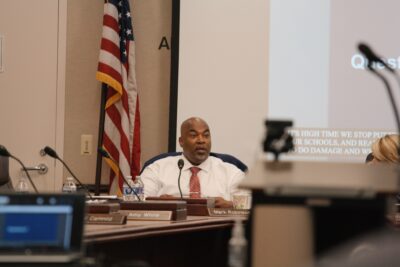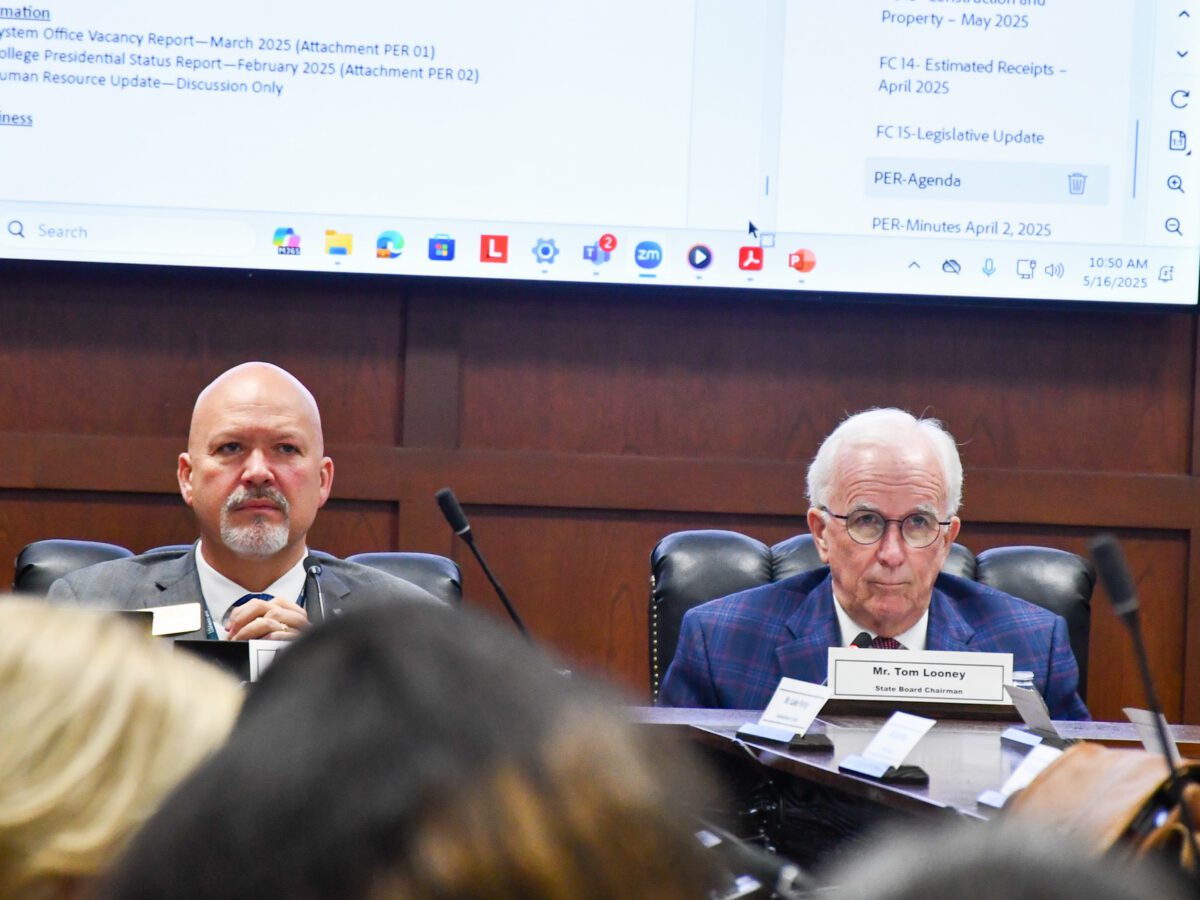
|
|
Since 2016, the N.C. Community College System (NCCCS) has been implementing a five-phased approach to modernize Enterprise Resource Planning (ERP) systems for the state’s 58 community colleges and system office.
An ERP system refers to the software colleges use that contains data on students, core financial management, grants, human resources, and payroll, among other things. Since 2023, the system has been on phase four of its modernization plan, which includes modernizing and upgrading core services at the system office and partnering with five community colleges to prepare local ERP systems to transition to Ellucian Banner SaaS.
“This work is not going to be easy, but the payout will be unbelievable when we can transition off of a 20-year-old ERP system,” Patrick Fleming, NCCCS senior vice president and chief information officer, said at the time. “We can no longer sustain 58 individual ERP systems if we’re going to become ‘the Extraordinary 58.’ We just can’t operate that way.”
Along the way, the system has faced several delays in an already long implementation process. Last week, the State Board of Community Colleges heard an update on the ERP modernization plan.
Phases 1, 2, and 3 of the plan are complete, and Phase 4 is underway. In March 2023, the NCCCS signed Amendment 4 to the ERP Enhancement and Support Services Agreement, using the Ellucian Banner® Standard Technology Platform.
“System Office application contract commitment dates agreed to in Amendment 4 were not met,” the system document says. “Amendment 5 signed December 2024, revised contract commitment dates for the System Office applications.”
Here’s a look at the timeline for plan phases:
According to the system, the combined course library is 60% complete, the data warehouse is 75% complete, and the college budget and accounting system is 85% complete. The customized training application is 100% complete and currently in production use, the system document says.
Phase 5 “is in the planning phase.” Here’s a look at where the budget stands for the project:
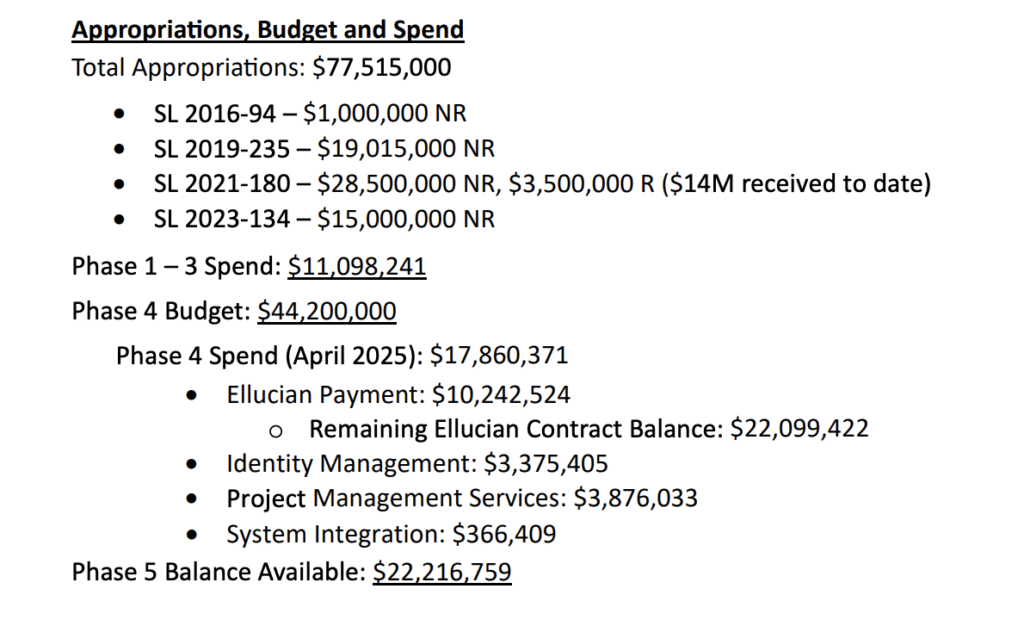
Cox said the ERP modernization is necessary in order to provide better services to students and colleges.
“These new solutions are going to provide better student services, enhanced analytical capabilities for us, and cybersecurity frameworks that are required for our system to continue to be a leader in workforce innovation,” he told the Board.
The pilot of the five community colleges is set to run through fall 2031, Cox said, but the system is already implementing core financial, curriculum management, business services, and advanced analytics through the program.
“Everyone working on the project is focused on delivery on high-quality product,” he said. “Unfortunately, project scope, system complexities, some resource constraints… have resulted in some missed contract delivery dates and schedule delays.”
To get back on track, Cox said the system has been having weekly meetings with Ellucian, along with weekly meetings with direct users group. He said the heaviest lift for the system is working through kinks in the initial pilot stage. He said phasing in the other 53 community colleges from 2026-2028 should be easier after that point.
“We recognize that remaining work is going to require continued staff focus, time, and effort,” Cox said. “The leadership team is working hard to provide direct program oversight and vendor engagement really at all levels.”
On Friday, the Board also approved two contracts related to the ERP project:
- A one-year contract extension for systemwide identity management support from Microsoft for the system office and the five ERP modernization pilot community colleges. The amount shall not exceed $930,000, according to the document. While funding is prioritized for the system and pilot colleges, Finance Chair Lisa Estep said it’s open to all colleges.
- A one-year contract extension for information technology service management from ServiceNow for the system office and pilot colleges, not to exceed $411,000.
The Board also voted to approve contracts for two learning management systems (LMS) used across the system, Moodle and Blackboard. As the system works to unify its ERP systems, some Board members said they would like to see a unified LMS system.
At the General Assembly, Senate Bill 133, “NCCCS Learning Management System,” would allow the NCCCS to solicit a Learning Management System (LMS) for all community colleges. Currently, community colleges across the system can each select their own LMS. The bill passed the Senate in March, so it can still be discussed this long session or included in the budget.
Board member Mark Merritt cautioned fellow members against a “one-size-fits-all” model.
“We really need to be careful when we have these situations where we try and impose a solution on 58 dissimilarly situated community colleges. They have different strengths, weaknesses, opportunities, threats, and serve different niches effectively,” he said. “When we’re talking about Blackboard and Moodle, my thought was we should be focusing on what’s the best platform that helps people learn — that has to be our goal.”
Merritt said the Board should elicit educator input before making these decisions.
“Let’s listen to our educators first, because they really have a lot of expertise and experience to bring, and if we don’t do that, I think we’ll risk disserving our students,” he said.
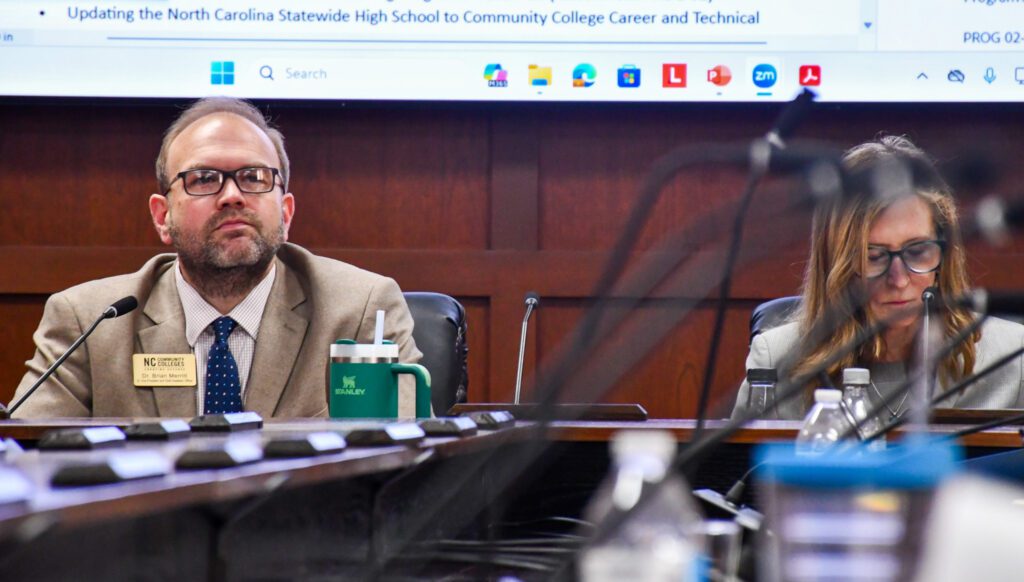
Latest data on IDD program
Over the last 10 months, 809 students across the NCCCS have received support through the system’s Access to Achievement program, which aims to serve students with intellectual and developmental disabilities (IDD).
The program was launched in 2022 with $500,000 allocated by the General Assembly. For the pilot, Catawba Valley and Brunswick community colleges were tasked with providing career pathway opportunities and resources for students with intellectual and developmental disabilities.
In 2023, lawmakers allocated nearly $4 million to offer the pilot at 15 community colleges. Funds were allocated to hire achievement counselors at the community colleges and for classroom materials and programming, a transportation study to determine barriers, and a two-year statewide marketing campaign.
Budget proposals from the House and the Senate would further expand the pilot to 25 community colleges.
Here are some other highlights from the annual report discussed by the Board last week:
- During the 2024-25 school year, 316 students accessed “high intensity services through Access to Achievement with a Person-Centered Plan.” Nearly 500 other students received less intensive support.
- Since May 2024, 78 students with a Person-Centered Plan have obtained a credential. This credential may be either a certificate, degree, or diploma. This number represents 25% of those students who have such a plan.
- The largest percentage of students served fell into the 16-24 age range, followed by the 25-34 age range.
- Approximately 75% of students reported their ethnicity as either Black/African American or white, with the remaining 25% reporting their ethnicity as American Indian or Alaskan Native, Asian, Native American, or Pacific Islander or Multiple.
- About 47% of students report as female, 43% report as male, and 10% chose not to answer.
- The largest number of students participated in College and Career Readiness classes, closely followed by curriculum. Many students are enrolled in coursework in more than one area of the college, the report said.
“This program serves as a model, not only for our state, but for the nation, in terms of building stronger vocational training and intellectual development and employment opportunities for IDD students,” Board member Sarah West said. “The sky is the limit, and I think we’re all very excited about what we’re seeing in this program, and then again, sustained evaluation efforts to support continuous improvement and impact — establishing our community college system as a model for the rest of the country.”
You can read the full report here.
Updates on local presidents and Board members
On Friday, the Board voted in closed session to approve the new president of South Piedmont Community College, who was announced on Monday by the college.
Dr. Stacy Waters-Bailey, who currently serves as vice president of transfer excellence and success at Forsyth Technical Community College, was unanimously selected as the college’s next president. She will start the role on July 1.

Waters-Bailey will succeed Dr. Maria Pharr, who led South Piedmont from 2017 to 2024 before stepping down to become president of Pitt Community College. Since then, Vice President of Finance and Administrative Services/CFO Michelle Brock has served as interim president.
“I am deeply honored and thrilled to lead South Piedmont Community College into its next chapter,” said Waters-Bailey, who has more than 15 years of leadership experience in higher education. “This institution has a proud legacy of transforming lives through education, and I am committed to building upon that foundation to create even greater opportunities for our students and community.”
Waters-Bailey was selected by the college’s board of trustees from a field of five finalists. In addition to Forsyth Tech, where she has worked since 2018, she has also worked at Davidson-Davie Community College, the University of Alabama, and Tidewater Community College in Norfolk, Virginia.
“She brings a proven record of visionary leadership, a deep commitment to academic excellence, and a dedication to student success that aligns seamlessly with the mission and values of our college,” Board of Trustees Chair Pat Kahle said. “We are confident that under her leadership, South Piedmont will continue to thrive, grow in service to our students and community, and remain a vital partner in economic and workforce development in Anson and Union counties.”
The Board also approved the reelection of six local presidents:
- Dr. Ken Ingle, at Alamance Community College, with a three-year extension.
- Dr. Amanda Lee, at Bladen Community College, with a five-year extension.
- David Heatherly, at Coastal Carolina Community College, with a one-year extension.
- Dr. Jay Carraway, at James Sprunt Community College, with a two-year extension.
- Dr. Chad A. Bledsoe, at Montgomery Community College, with a four-year extension.
- Dr. Alexander “Sandy” Stewart, at Sandhills Community College, with a three-year extension.
Finally, members also discussed 10 upcoming expiring terms on the Board: Paula Benson, Dr. Shirley Carraway, John Kane, Geoffrey Lang, Mark Merritt, Hari Nath, Ray Russell, Terry Van Duyn, Ann Whitford, and student representative Autumn Queen.
Those Board members’ terms expire on June 30, 2025, but the Board is not set to meet in June, meaning last week could have been those members’ last meeting.
However, only Whitford is ineligible to serve on the Board again after having served since 2009.
Whitford, Merritt, Russell, Van Duyn, and Carraway were all appointed by the governor, meaning the governor can appoint someone else, or reappoint eligible members. The other members were appointed by either the House or Senate.
Queen will be replaced by the next president of the NC Comprehensive Community College Student Government Association (N4CSGA).
Board Chair Tom Looney thanked the Board members for their service and said the Board would gather to celebrate outgoing members once the governor and General Assembly make their appointments. Looney said the General Assembly typically includes those appointments in the budget.
“We’ll recognize all the folks who’ve had significant contributions over the years to support this system and get us to where we are today,” Looney said. “I am proud of the work everyone has done, and we will hopefully know before the end of June what the status is of all these members.”
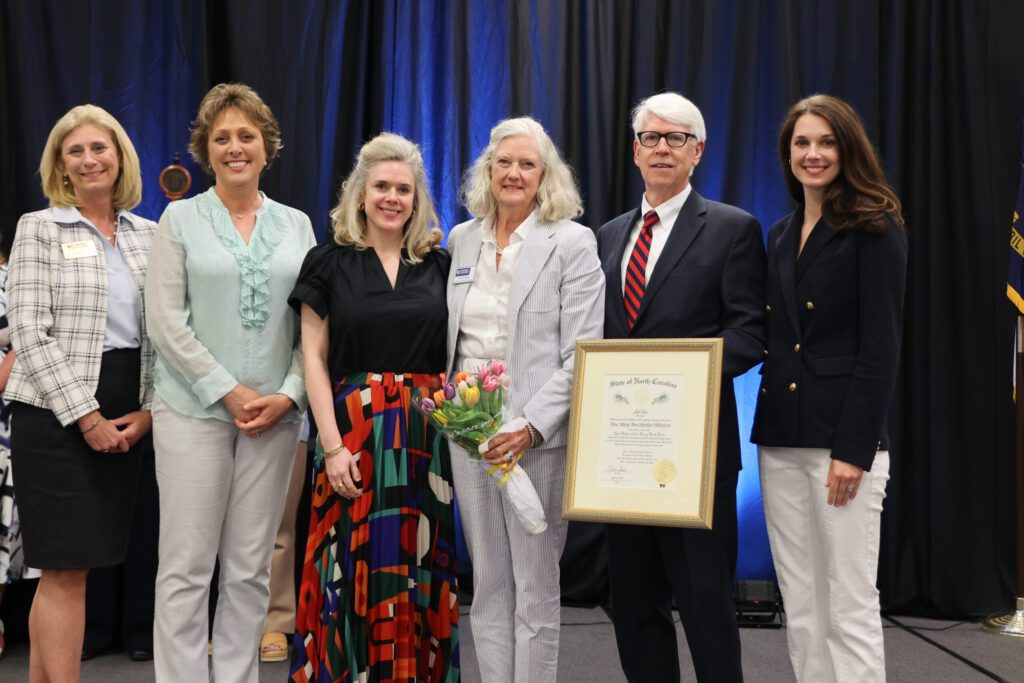
Whitford, who attended her last meeting as a Board member on Friday, was recognized for recently receiving the Order of the Long Leaf Pine, the highest award for state service granted by the Office of the Governor.
Carteret Community College presented Whitford with the award during its 35th Annual Awards Ceremony earlier this month, according to a release from the college.
“Mrs. Whitford has been an indefatigable supporter of our state’s Great 58 community colleges, championing access for all North Carolinians and advocating for innovation and strategic improvements that serve our students, employers, and communities,” President Dr. Tracy Mancini said.
Whitford, a former teacher, was appointed to the Carteret Community College Board of Trustees in 1993, according to the release.
In 2009, Gov. Beverly Perdue appointed Whitford to the North Carolina State Board of Community Colleges, where she has served for 14 years.
Cox praised Whitford for leading the development of the system’s 2022 strategic plan.
“This document continues to guide our work,” he said. “Her leadership helped shape the future of the entire system.”
Other meeting items
- The Board voted to approve updates to the North Carolina High School to Community College CTE Articulation Agreement, which aims to create a seamless process to join secondary and postsecondary Career and Technical Education (CTE) programs of study. Those changes are listed starting on page 2 of the Board document.
- The Board also approved a waiver of Board policy regarding Career and College Promise (CCP) to expand dual enrollment eligibility criteria to 9th and 10th grade students in CTE pathways for colleges participating in an upcoming pilot program. The waiver will remain in effect through Aug. 15, 2026.
- Over the last few meetings, NCCCS staff has updated Board members on 11 of the 17 tactics included in the system’s strategic plan. On Thursday, the Board heard updates on the final six tactics: data warehouse; program approval, termination, and alignment; HR policy and procedures; strategic enrollment management project; grant writing and funding; and rural college supports. You can view that presentation here.
- The audit and accountability committee discussed several reports, including a cybersecurity update, college financial audit five-year summaries, college compliance reviews, and a hiring process review.
- The Board approved initial proprietary licensure for five proprietary schools, which are for-profit businesses that provide vocational education and training. The Board also approved renewals of licensure for 121 proprietary schools. In North Carolina, per state law, they are licensed by the State Board of Community Colleges, through the State Board of Proprietary Schools, which was created in 2011.
The Board is not currently scheduled to meet in June, meaning the next meeting is July 17-18.




